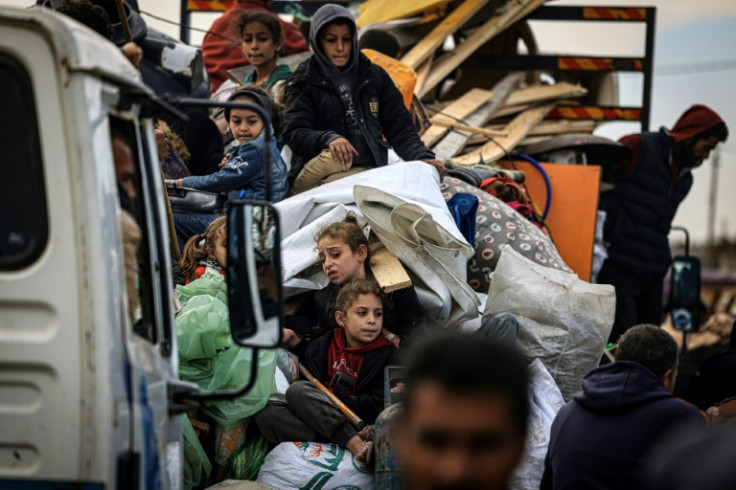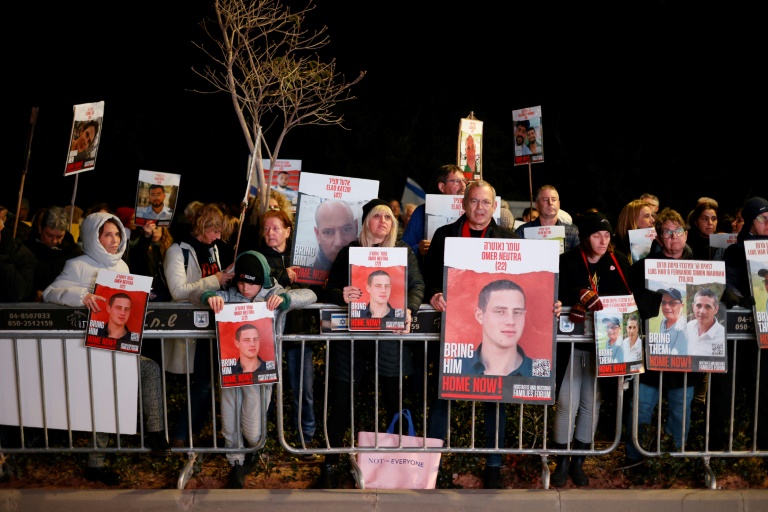The UN agency for Palestinian refugees was under fire after staff members were accused of participating in the October 7 attacks, while fighting in Gaza sent more people fleeing south towards the Egyptian border.
Israeli Foreign Minister Israel Katz called for Philippe Lazzarini, the head of the UN agency for Palestinian refugees, UNRWA, to quit over the deepening row and several countries suspended funding.
The agency said on Friday it had fired several employees over Israel’s unspecified accusations and promised a thorough investigation.
“Mr Lazzarini please resign,” Katz said on social media platform X late on Saturday in response to a post by the UNRWA chief warning that the funding cuts meant the agency’s operation in Gaza was close to collapse.
Katz said earlier that UNRWA “must be replaced with agencies dedicated to genuine peace and development” in the rebuilding of Gaza after the territory’s bloodiest war.
Donors including Germany, Britain, Italy, Australia and Finland on Saturday followed the lead of the United States, which said it had suspended additional funding to the agency over the accusations.
Hamas slammed Israeli “threats” against UNRWA on Saturday, urging the United Nations and other international organisations not to “cave in to the threats and blackmail”.
The Islamist group’s October 7 attack resulted in about 1,140 deaths in Israel, mostly civilians, according to an AFP tally of official figures.
Militants also seized about 250 hostages and Israel says around 132 of them remain in Gaza, including the bodies of at least 28 dead captives.
The Israeli military offensive, which began in late October, has killed at least 26,257 people, most of them women and children, according to Hamas-ruled Gaza’s health ministry.
Long-strained relations between Israel and UNRWA deteriorated rapidly after the UN body condemned tank shelling it said had hit a shelter for displaced people in Gaza’s main southern city of Khan Yunis.
The agency said tens of thousands of displaced people had been registered at the shelter and that Wednesday’s tank shelling killed 13 people.
The Israeli military has promised a thorough review but has also said it was examining the possibility it was a “result of Hamas fire”.
The Israeli military campaign is now centred around Khan Yunis, the hometown of Hamas’s Gaza chief Yahya Sinwar, where it said on Saturday numerous militants were killed.
Israeli Prime Minister Benjamin Netanyahu, who is facing growing domestic pressure over his handling of the conflict, doubled down on his vow to eliminate Hamas from besieged Gaza.
“If we don’t eliminate Hamas terrorists… the next massacre is only a matter of time,” he said in a televised statement on Saturday.
Experts have told AFP that Netanyahu’s steadfast promise to eliminate Hamas is increasingly seen within his war cabinet as incompatible with returning the hostages held in Gaza.
His failure to bring home the captives has led to mounting protests, more of which took place on Saturday night.
Protesters carrying posters of the hostages and banners calling to “bring them home” gathered in Israel’s commercial hub Tel Aviv on Saturday, as well as near Netanyahu’s residence in the upscale coastal town of Caesarea.
The row between Israel and UNRWA follows the UN’s International Court of Justice ruling on Friday that Israel must prevent possible acts of genocide in the conflict, and allow in more aid.
The UN Security Council will meet on Wednesday to give “binding effect” to the decision, which stopped short of calling for a ceasefire.
Diplomatic efforts to find a solution have also gathered pace.
CIA chief William Burns is to meet his Israeli and Egyptian counterparts, as well as Qatar’s prime minister, in Paris soon to seek a ceasefire, a security source told AFP.
A week-long cessation of hostilities in November saw Hamas release dozens of hostages in exchange for Palestinian prisoners held by Israel.
The New York Times said on Saturday that US-led negotiators were getting closer to an agreement under which Israel would suspend its war in Gaza for about two months in return for the release of more than 100 hostages.
Quoting unidentified US officials, it said negotiators had developed a draft agreement that would be discussed in Paris on Sunday.
Palestinians are fleeing further south from Khan Yunis towards Rafah, close to the Egyptian border, where the United Nations says most of Gaza’s estimated 1.7 million displaced people have gathered.
AFP images showed people wading through ankle-deep water around plastic shelters in Rafah, where bombardment still threatens.
“I didn’t find shelter, I didn’t find a tent, I didn’t find anything”, said 70-year-old Umm Imad, displaced from a town east of Khan Yunis.
The Doctors Without Borders (MSF) aid group has said surgical capacity at the Nasser Hospital in Khan Yunis was “virtually non-existent”.
The Palestinian Red Crescent Society said the Al-Amal hospital was also “under siege with heavy gunfire”.
The Israeli military accuses Hamas of operating from tunnels under Gaza hospitals and of using them as command centres, a charge the group denies.
AFP

AFP






